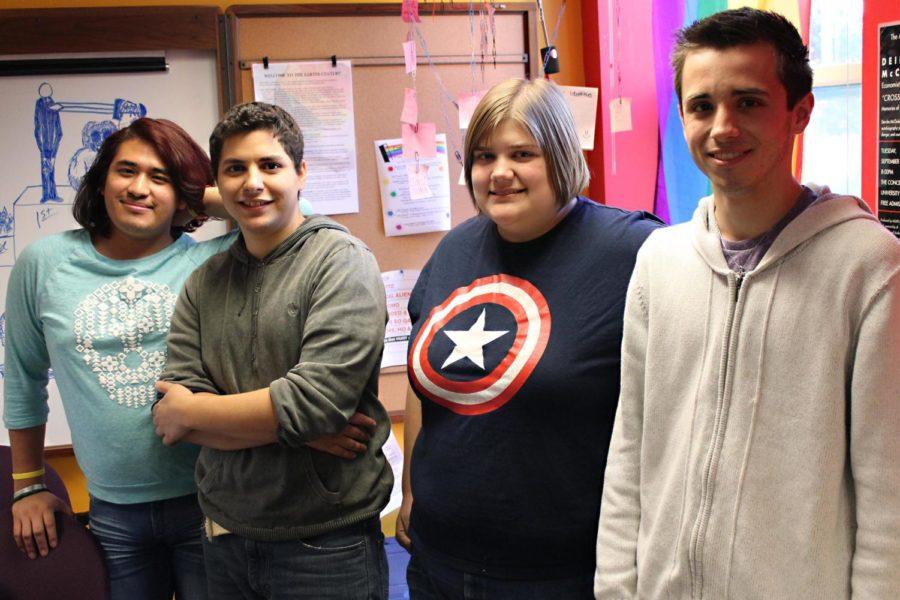Students find courage to come out
Josue Mendez, left, Sid Taha, Melanie Pope, and Blake Miller, president of the LGBTA Alliance, discussed with the Daily the difficulties and hurdles they and others in the LGBT community have faced when coming out to their peers and families.
October 17, 2013
Walking through a Chicago area mall, Sahid Taha, reached down and held hands with the girl he liked. He felt nothing. It was bland. Taha thought he was finally going to be straight.
In first grade, Taha was attracted to a boy in his class. At Catholic school, he was taught it was wrong to like boys, so he tried to force himself to like girls and convinced himself he had a crush on his female best friend.
“I had no idea what was going on with me; one, because I was having feelings for males, but at the same time I was stuck in a society where it says you can’t do that,” Taha said.
Taha, junior in electrical engineering, didn’t accept he was gay until his sophomore year in high school, three years after being confronted by his mother.
His name was screamed from the living room and when Taha came in he saw his mother sitting on the couch with her laptop. Taha’s mother flipped the laptop around and showed him a website he had visited earlier. It was gay porn.
“I was freaking out, and I just didn’t say a word. I just cried and cried just standing there while she was sitting on the couch,” Taha said. His mom then sent him to his room.
Taha said that from seventh grade until his sophomore year of high school he tried to change even more than before. Taha spiraled into suicidal depression.
“I would pray to God. I would pray to Allah. I didn’t care who the hell I was praying to,” Taha said. “I was just like, ‘Please, one day can I just wake up and just be straight, because my life would just be a thousand times easier if it was just that way.'”
He tried to date girls in high school, but Taha was not physically attracted to them. Taha liked men but couldn’t see himself dating one because society said it was not OK.
When Taha was 15, he brought up the topic to his mom. Through tears, Taha told his mom he was so confused and he was not attracted to women.
Taha’s mom just smiled, said, “You’re gay,” and talked with him about it while they sat in his room.
Taha’s mom had bought books on all the things she thought a boy might have to deal with growing up. The only topic her books did not cover was the possibility of her son being gay.
“Once she accepted it, it was so much easier to come out to everybody else, because I felt like if I have the support and the love of my mom still, then it doesn’t matter who else supported or loved me. I still have my mom,” Taha said.
Taha was nervous to tell his friends. He remembers shaking and choking when he came out to them. Most of his friends were girls, and he said it was much easier to tell them than guys.
Melanie Pope, junior in elementary education, would sometimes have a female friend sit on her lap in high school.
“It was completely platonic, but people would make really rude comments about it,” Pope said. There was a lot of underhanded anti-gay sentiment at her high school, where people would say “that’s so gay” often.
Pope was very frustrated about things people would say. Nothing was ever directed at her. Pope said people knew she would stand up for herself.
“It was frustrating; it’s not something nice to hear all the time that what you are is something bad,” Pope said.
For a long time Pope denied liking girls and thought she couldn’t possibly be gay. The first time Pope was faced with her sexual identity was when she felt like she had a crush on her best friend.
Pope’s parents had always told her they loved her no matter what. Once she accepted her sexuality, she did not have a problem coming out to them.
Pope came out as bisexual after she moved to Minnesota and her class size increased by 400. She got involved in an anime community who she felt was very embracing of the LGBT community.
“I never really had to come out to a bunch of people who I’d known for a long time till much later,” Pope said. Even though there was anti-gay sentiment at her high school, there were still resources that had been unavailable at her home in Iowa.
Pope is vice president of the LGBTA Alliance and is a member of Gamma Rho Lambda, a sorority for LGBT and ally women.
Pope was slow to come out to people in her major.
“It’s really complicated because you’ll hear stories of like elementary school teachers facing a lot of discrimination from parents for their orientation,” Pope said. The longer Pope has been in her major, the more welcoming it has turned out to be, she said.
Taha is in Sigma Chi fraternity as well as being in the LGBT community. Taha was accepted by most of his fraternity right away. Others became more accepting as they got to know him.
When people used anti-gay language around his fraternity, Taha’s brothers jumped to defend him.
“It’s not always about being rejected by your parents or having family hate you,” Pope said. “There are families that will love and accept you and friends who won’t turn their backs to you. I think that’s the best part.”







